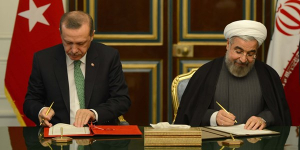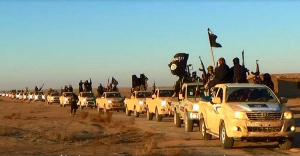Ankara Pursues Persian Partnership
By Richard Weitz (vol. 7, no. 13 of the Turkey Analyst)
The Turkish government has recently been seeking to improve its ties with Iran. Even when bilateral relations were most tense, as in 2012 and 2013, Turkey and Iran declined to break relations comprehensively. They continued to pursue robust economic exchanges while compartmentalizing their regional security differences. The past year has seen decreasing differences between Ankara and Tehran over Iran’s nuclear program. The declining prospects of Ankara’s anti-Iranian allies in Syria and the advent of an unexpectedly virulent militant Sunni insurgency in Iraq also contribute to creating a new regional dynamic. The Turkish-Iranian relationship is multi-faceted and although recent developments may have brought the two countries closer again, their relation is set to remain beset by complications and contradictions.

You Reap What You Sow: The Rise of ISIS and the Sectarian Dimension of the AKP’s Foreign Policy
By Halil Gürhanlı (vol. 7, no. 12 of the Turkey Analyst)
As the the Sunni militant group, the Islamic State of Iraq and al-Sham (ISIS), keeps expanding its sphere of influence deeper into Iraq, the Justice and Development Party (AKP) government of Turkey is facing a very real fear. Its neo-Ottoman dream of becoming a regional hegemonic power revered by ideologically affiliated governments in the Middle East is turning into a nightmare. The rise of ISIS is a painful reminder for Turkey that its Middle Eastern policies are bound to cause unpleasant side effects.

Russia-Turkey Strains Deepen Over Syria
By Richard Weitz (vol. 5, no. 20 of the Turkey Analyst)
Despite vigorous efforts by Russian and Turkish policy makers, differences over Syria threaten to disrupt what has been a harmonious relationship. Leaders in Ankara are calling for President Bashar al-Assad’s immediate departure, while Moscow continues to support his regime if not al-Assad personally. Turkey’s leading role in organizing the anti-Assad resistance, Syria’s cross-border shelling of Turkish territory and Ankara’s recent decision to force a Syrian plane from Russia to land in Turkey threaten to worsen ties. However, Russia is nonetheless unlikely to take any drastic, punitive measures against Turkey because of the two countries’ still strong overlapping interests in other areas.
Turkey's Changing Syria Policy: Giving Diplomacy a Chance?
By Veysel Ayhan (vol. 5, no. 20 of the Turkey Analyst)
Turkey’s Prime Minister Recep Tayyip Erdoğan and Iran’s president Mahmoud Ahmedinejad, meeting in Baku, Azerbaijan on October 17, proposed that the crisis in Syria be addressed through diplomatic methods and called for the establishment of an international mechanism for dialogue involving countries in the region as well as other interested powers. If pursued, this return to diplomacy would amount to a dramatic shift on the part of Turkey which has until now privileged military means seeking to bring about regime change in Syria by aiding the rebels. However, the crucial question is whether Turkey’s groundbreaking diplomatic initiative of Turkey does indeed represent a strategic withdrawal from its previous stance or rather a temporary, tactical move.
Turkey-Azerbaijan Summit Consummates Reconciliation
By Richard Weitz (vol. 5, no. 18 of the Turkey Analyst)
Turkish-Azerbaijani relations have been on the rebound in recent months since the Turkish-Armenian reconciliation effort, launched in 2008, has effectively collapsed over differences regarding the Armenian-occupied territories of Azerbaijan and the disputed region of Nagorno-Karabakh. The summit earlier this month between the two governments will accelerate this process, especially by helping them develop their energy partnership.




